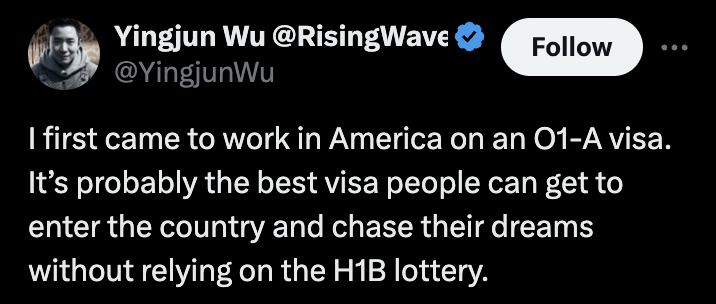Rohit Mittal is the co-founder and CEO of Stilt. Rohit has extensive experience in credit risk analytics and data science. He spent years building credit risk and fraud models for top U.S. banks. In his current role, he defines the overall business strategy, leads debt and capital fundraising efforts, leads product development, and leads other customer-related aspects for the company. Stilt is backed by Y Combinator and has raised a total of $275M in debt and equity funding to date.
See all posts Rohit MittalHow to get PR for your O-1 visa
O-1 is one of the best visas for people who want to work in the US but don’t want to rely on the H-1B lottery.

When you apply for your O-1 visa, you have to show extraordinary ability in your area of expertise.
There are a total of 8 categories to showcase your extraordinary ability. You have higher chances of approval if you qualify across at least 5 of the 8 categories. One of the most important categories is “Published material about you and your work in professional or major trade publications or media.”
Most highly qualified people find it difficult to have articles written about them. This is true for aspiring entrepreneurs, employees in executive positions at large companies, early employees at startups, junior investors starting their careers, etc.
Immigration lawyers can’t help with published materials with major media outlets. This leaves you in a difficult position because it significantly reduces your chances of getting approved for your O-1 visa.
As a petitioner, it is important to figure out different ways you can get published materials to aid your O-1 application.
PR has a broader meaning in regard to “published material” for O-1 visa. You may think of it just as an article in a publication but it could be a lot more. Published materials include speaking engagements, public awards, expert commentary, collaborations with popular people, and much more.
Below is a robust list of 20 ways to help you get visibility for published materials:
Media coverage
Get featured in industry publications, blogs, or podcasts. The more niche and respected, the better.
There are media agencies that can help get articles published for you.
Here’s an example: Presscart. They help you get coverage in 3-5 large publications that’s focused on your area of expertise. The process could take anywhere from a few weeks to a couple of months.
There are many companies that can help you tell your story to the media. If journalists like the story and write an article about you, that is strong proof of your extraordinary ability.
Press releases
You can also send press releases for any accomplishments directly through services like presswire. Once approved, it is sent to Presswire’s website and from there many media publications pick it up. To get approved, you’ll need to craft compelling announcements about your achievements, projects, or innovations.
Press releases are not considered as strong as media coverage. Because press releases are shared by the applicant (or their company) but media coverage is external validation. Having said that, press releases picked up by reputed media publications still count.
Speaking engagements
Present at conferences, workshops, or webinars. Record and share these appearances.
Awards and recognition
Pursue and highlight accolades from respected organizations in your industry.
If you have a computer science background and are looking to earn awards, participate in hackathons. If you could win them, you could show that as an award.
Here are 2 sites to help you find hackathons:
Collaborations
Partner with well-known figures or institutions and publicize these joint efforts.
Publish
Write articles, papers, or even a book related to your expertise.
Expert commentary
Offer insights to journalists on topics in your field. This can help you get cited quickly in the biggest publications. There are websites like HARO (Help a Reporter Out), now called Connectively, where you can respond to open questions by reporters. But remember that it costs money to access this.
Patents or innovations
If applicable, highlight any groundbreaking work you’ve done. Filed patents or highly attributed research are strong indicators of your expertise.
Guest lectures
Teach at universities or institutions and document these experiences. Being a lecturer gives you visibility and credibility.
Exhibitions or performances
For artists or performers, showcase your work publicly.
Industry rankings
Get listed in “Top” or “Best” lists relevant to your field. This is another big one to help you prove expertise.
Social media presence
Build a strong, professional profile on platforms relevant to your field.
Testimonials
Gather endorsements from industry leaders and make them public.
Personal website
Create a professional site showcasing your work, achievements, and media mentions.
Viral content
Create shareable content that demonstrates your skills or knowledge.
Philanthropy
Engage in and publicize charitable work related to your field.
Documentary or short film
Consider producing content about your work or journey.
Podcast or video series
Start your own to establish thought leadership.
Mentorship programs
Participate in or create programs to share your expertise.
Case studies
Develop detailed examples of your work’s impact.
Remember, it’s not just about getting PR – it’s about strategic PR that aligns with O-1 criteria. Focus on quality over quantity, and always tie back to how your contributions are extraordinary in your field.
Good luck, and let’s make that O-1 happen!
